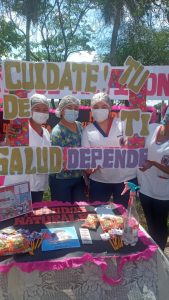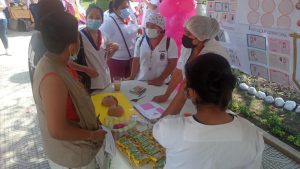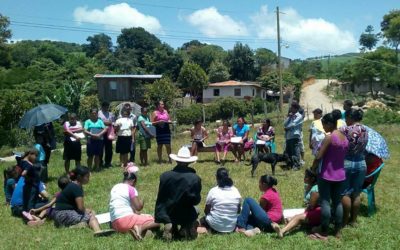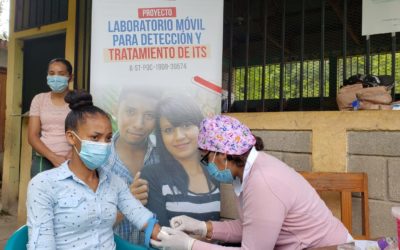The Waal Foundation (FdW) in Bolivia has trained prevention mediators since 2006 and since 2017 has integrated its work into the approaches of the National Intercultural Community Family Health Policy (SAFCI). A little over 60,000 people have applied the SAFCI criteria to work with the population of reproductive age at the community level to date.
The SAFCI health policy implementation strategy was created in 2008, through Supreme Decree No. 29601 and is understood as a participatory and empowering political process, oriented to the knowledge and control of the social, economic, cultural and environmental determinants of health. These must be carried out in co-responsibility between the organized population, authorities and the health team, to solve health problems. Part of a model of intercultural community family health and prioritizes health promotion and disease prevention.
Among its objectives are the respect and articulation of biomedical medicine and Bolivian indigenous peoples and peasants, as well as contributing to the improvement of the population’s living conditions . The family approach constitutes the link between the health services and the families of the community or neighborhood. Based on family visits, processes of health promotion, prevention, control, treatment and rehabilitation are carried out.
From the FdW, the prevention work with the SAFCI policy is developed with a comprehensive approach that brings together the various actors, to go beyond the individual and institutional sphere and to be situated in the collective. The program includes instruments and consultancies that must guarantee a structured work with the population, which includes adolescents as beneficiaries in schools, users of health services, men and women from the community.
The SAFCI application strategy starts from health promotion as a continuous political process of social mobilization, through which the team of health professionals and social actors are jointly responsible. Therefore, they take on tasks to face the economic, social, and cultural determinants that we have mentioned and that affect the health of the community, in addition to adopting healthy protective habits.
We refer to a health model in which social co-responsibility plays a fundamental role, which achieves changes in the population’s attitudes and practices. Additionally, it seeks to increase coverage and improve the quality of care for families with lower incomes. For this reason prioritizes Primary Health Care (PHC) and health promotion as the main tools.

These tools are carried out with a gender perspective, which contributes to reducing inequalities and inequities between men and women.
SAFCI interventions take into account the gender and masculinities approach to make decisions related to sexual reproductive health and generate social co-responsibility and eliminate inequalities. In the same way, with a focus on environmental health, in order to be part of the preservation and protection of the environment and its benefits in clean air and sanitation.
The Waal Foundation carries out annual calls to train mediators for the SAFCI Training Course. This information is published on the web https://fundaciondewaal.org/ and on Facebook https://www.facebook.com/FundacionDeWaal
Among the various actions that the FdW proposes to create and strengthen a culture of prevention is the establishment of alliances to guarantee support for preventive changes and practices, through the beneficiaries themselves, the community, public institutions, private entities, NGOs .

The joint work between the professional associations of Doctors and Nurses, the coordination of the Health Network with the Departmental Health Services, especially with the Sexual and Reproductive Health programs. As well as the links with the Departmental Education Services in the adolescent pregnancy prevention campaigns in the municipality of El Alto, with the support of the Foundation Cerefe – Center for Physical Rehabilitation and Special Education , are some of the alliances developed at this time.
The SAFCI course developed by the Foundation in Bolivia aspires to contribute to the incorporation of responsible and healthy changes in people’s behavior, which integrate the education, health and community development sectors.
The objective is to train them as mediators and promoters of a culture of prenatal and postnatal prevention of deficiencies and disabilities that impede the full development of unborn babies and infants up to 2 years of age, as well as the prevention of adolescent pregnancy. .
In this way, promotional actions are facilitated, the main strategy of SAFCI. The people who are part of this training will be able to identify and address the social and health determinants that affect impairments and disabilities; detect them early and define timely stimulation actions in personal, labor, institutional and community practice.
At the FdW we are convinced that the management of risk factors and health determinants should be part of public and private development proposals, so the training focuses on the need to create an environment of prevention and stimulation before and after birth, as the basis for the development of healthy communities and societies.
The Foundation awards 80% scholarships to those interested in participating in this opportunity. The requirements to access this benefit, as well as all the information regarding the course Maternal and neonatal health, of children under two years of age and prevention of adolescent pregnancy can be consulted at the following link: https://fundaciondewaal.org/index.php / event / safci-bolivia /
If you are interested in participating in this program, it is important that you know some of the necessary conditions to take part. You must have at least three years of high school education, as well as motivation to become a PreNatal mediator or mediator.
Willingness to develop an educational work in a group is required, with good levels of communication to share your new knowledge with colleagues and with the population. Thus, your capacity and availability for self-training and information analysis are also necessary.
At the end of the training, you will be able to develop actions to prevent deficiencies and disabilities of prenatal origin, in your environment and in the work, institutional and community spheres . You will be able to contribute to the construction of a culture of prenatal prevention of deficiencies and disabilities, by being able to recognize in the couple and their environment the risks associated with prenatal deficiencies and disabilities.
You will obtain the tools to identify and address the social and health determinants that affect the development of the unborn baby, and in the first two years of life of infants.



